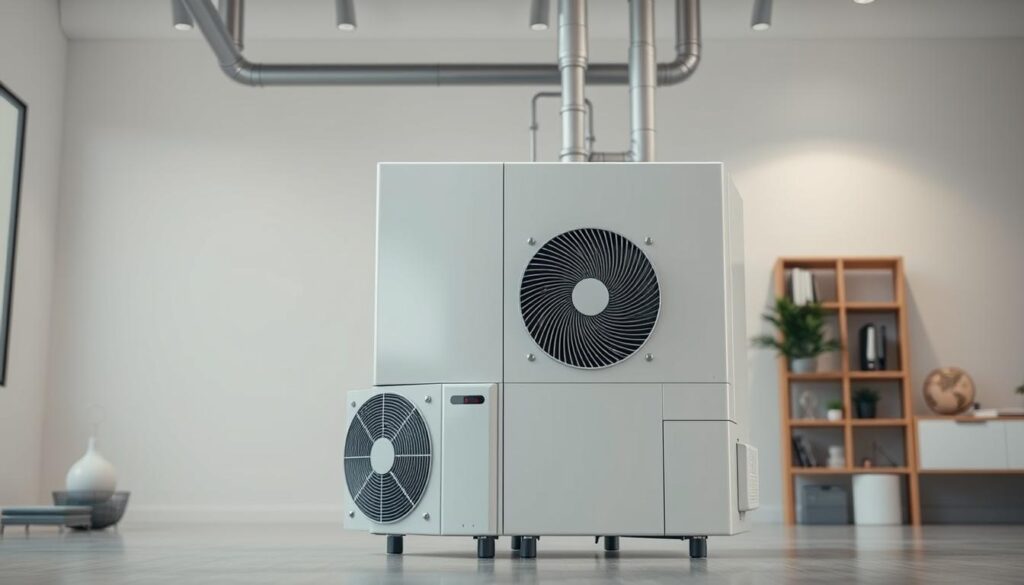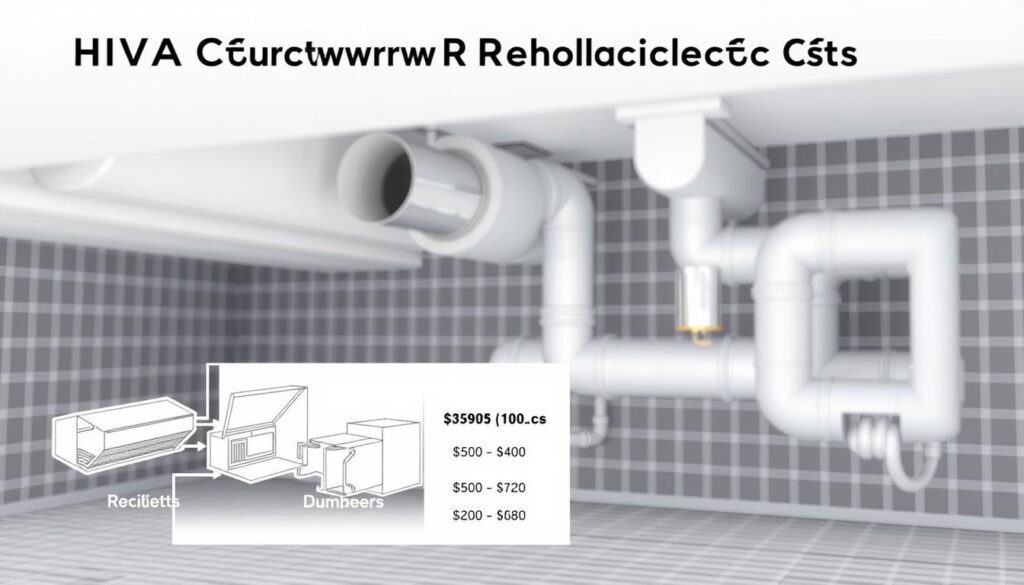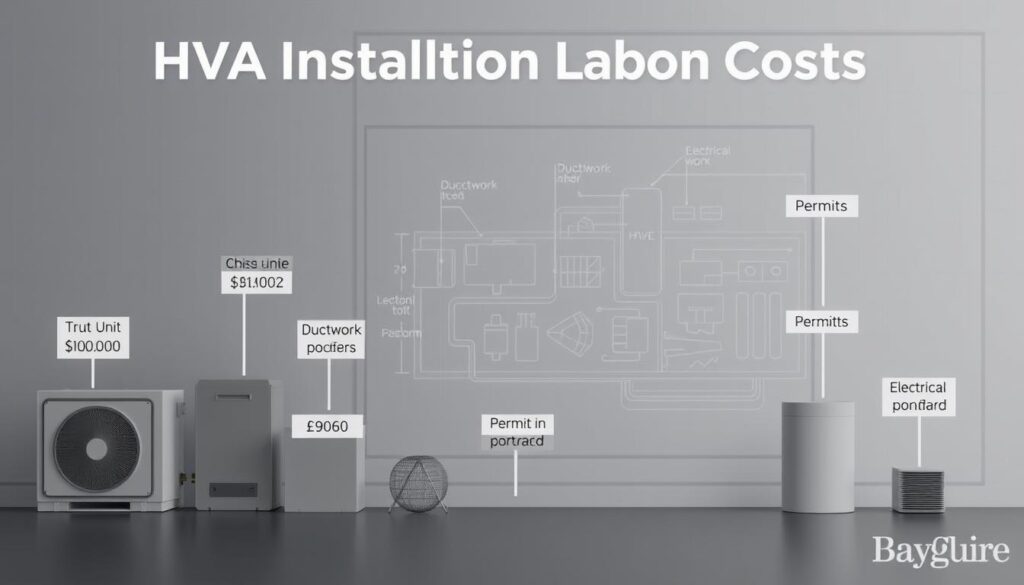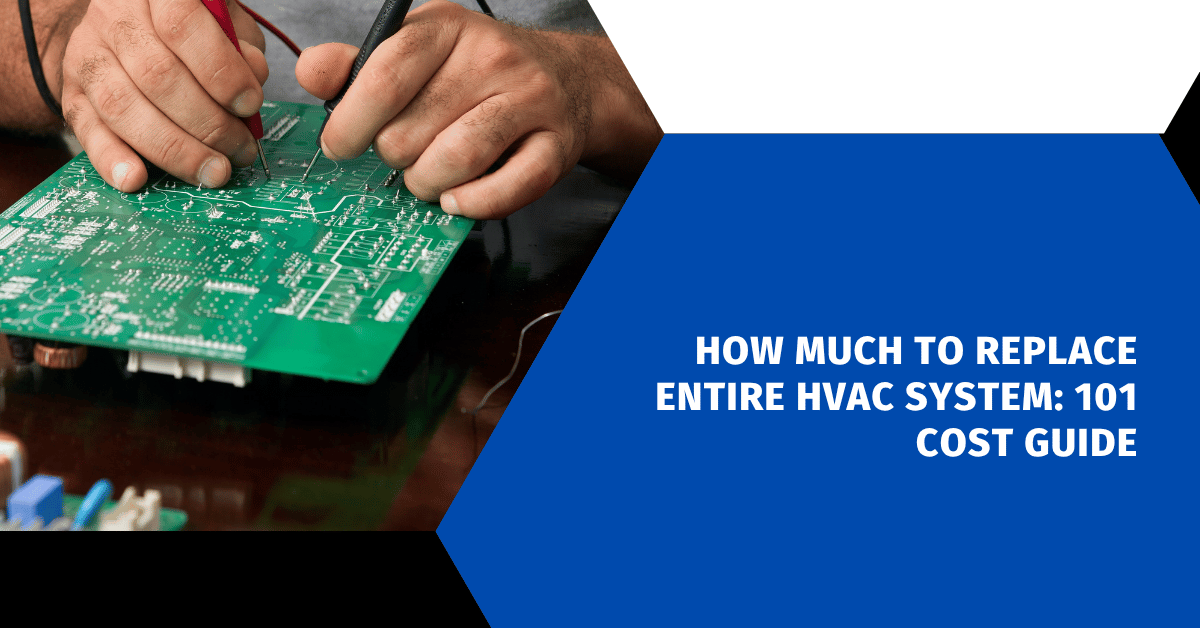Affiliate Disclosure
HVAC Guide Guys is a participant in the Amazon Services LLC Associates Program, an affiliate advertising program designed to provide a means for sites to earn advertising fees by advertising and linking to Amazon.
How Much to Replace Entire HVAC System? Ever wondered what it costs to replace your home’s heating and cooling system? It’s a complex maze of expenses and choices. Understanding the cost can be tough.

The cost to replace an HVAC system varies a lot. It can be between $5,000 and $16,000 for most homes. Your exact cost depends on your home’s size, the system’s complexity, and its efficiency. Knowing the cost requires looking at your home’s specific needs.
This guide will cover all you need to know about replacing your HVAC system. It will help you choose wisely, balancing comfort, performance, and cost.
Key Takeaways
- Average HVAC replacement costs range from $5,000 to $16,000
- Total expenses depend on home size and system complexity
- Energy efficiency can impact long-term cost savings
- Professional assessment is key for accurate pricing
- Many financing options are available for homeowners
Table of Contents
Understanding HVAC System Basics and Components
Replacing your home’s heating and cooling system is a big deal. It’s important to know the basics of HVAC. Modern systems are complex and aim to keep your home comfy while saving energy.
- Heating unit (furnace or heat pump)
- Cooling unit (air conditioner)
- Ductwork and ventilation system
- Thermostat and control mechanisms
Core Components of Your HVAC System
Each part has its own job. The heating unit keeps you warm in winter. The cooling unit cools and dries the air in summer. Ductwork spreads the air around your home.
| HVAC Component | Primary Function | Average Lifespan |
|---|---|---|
| Furnace | Generate heat | 15-20 years |
| Air Conditioner | Cool and dehumidify | 10-15 years |
| Heat Pump | Heating and cooling | 10-15 years |
System Lifespan and Replacement Timing
Most people replace their HVAC every 10-15 years. Proactive maintenance can help it last longer. But, knowing when it’s time for a new one is key.
Common Signs of System Failure
Look out for these signs that your system might need to be replaced:
- Inconsistent room temperatures
- Increased energy bills
- Frequent repair requirements
- Strange noises or odors
- System age exceeding 15 years
Knowing these basics helps you make smart choices about replacing your system. This ensures your home stays comfy and efficient for a long time.
Average HVAC Replacement Cost Breakdown
Knowing the cost of replacing your HVAC system is key to planning your budget. The average cost for a new HVAC system is between $5,000 and $12,500. Most people spend about $7,500 for a full system.
The cost of your new HVAC system depends on several factors. Let’s look at the main expenses:
- Equipment costs: 50-60% of total budget
- Labor installation: 30-40% of total project
- Additional expenses: 10-20% for permits and modifications
Here’s a detailed breakdown of the costs:
| HVAC Component | Average Cost Range |
|---|---|
| Central Air Conditioner | $2,500 – $5,500 |
| Furnace | $2,000 – $5,000 |
| Heat Pump | $4,000 – $7,500 |
| Ductwork Installation | $1,000 – $3,000 |
Pro tip: Always get multiple quotes and consider long-term energy efficiency when calculating your total hvac replacement cost.
Explore Our HVAC Shop
Looking for top-rated HVAC tools, parts, and accessories? Visit our shop and find the perfect solution for your needs.
Visit the ShopFactors Affecting Your HVAC Installation Price
Getting an HVAC system is a big choice for homeowners. The cost to replace an AC unit can change a lot. Knowing what affects the price can help you save money.
Your home’s special features are key in figuring out the cost of HVAC installation. Let’s look at the main things that affect the price:
Home Size and Layout Considerations
The size and shape of your home matter a lot. Bigger homes need stronger, pricier systems to keep the temperature right. Think about these important points:
- Square footage of your living space
- Number of floors and rooms
- Ceiling height and insulation quality
- Window placement and home orientation
“The right HVAC system is about precision, not just size” – HVAC Professional
System Efficiency Ratings
Efficiency ratings really matter for both upfront and long-term costs. The Seasonal Energy Efficiency Ratio (SEER) shows how well your system works:
- Higher SEER ratings mean better energy efficiency
- More efficient systems cost more upfront
- Lower energy bills can offset initial investment
Brand Selection Impact
Not all HVAC brands are the same. Your choice can greatly affect the cost of replacing your AC unit. Top brands offer:
- Better reliability
- Extended warranties
- Advanced technological features
- Higher initial investment
Thinking about these factors can help you make a wise choice for your home’s comfort and energy use.
How Much to Replace Entire HVAC System: Complete Cost Analysis
Understanding the full costs of an HVAC overhaul is key. Homeowners need to know that costs go beyond just the equipment. They must consider other expenses too.
The cost to replace an HVAC system can range from $5,500 to $16,000. This depends on several important factors. Your costs will vary based on:
- Home square footage
- System efficiency ratings
- Local labor rates
- Equipment complexity
To help you plan your HVAC overhaul expenses, we’ve made a detailed cost breakdown:
| System Type | Average Cost Range | Installation Complexity |
|---|---|---|
| Basic Single-Stage System | $5,500 – $8,000 | Low |
| Two-Stage System | $8,000 – $12,000 | Medium |
| Variable-Speed System | $12,000 – $16,000 | High |
Pro tip: Always get multiple quotes and consider long-term energy efficiency when calculating your total investment.
Your final HVAC replacement cost will depend on your home’s needs and the system you choose. Getting a professional assessment is key for accurate pricing.
Explore Our HVAC Shop
Looking for top-rated HVAC tools, parts, and accessories? Visit our shop and find the perfect solution for your needs.
Visit the ShopTypes of HVAC Systems and Their Costs
Choosing the right HVAC system is key to your home’s comfort and energy use. Each system has its own benefits and costs. It’s important to know your options before buying a new furnace.
There are many HVAC systems to choose from. Each has its own features and prices. Understanding these options is essential before investing in a new furnace.
Central Air Systems
Central air conditioning is a top pick for cooling your whole home. Prices vary from $1,900 to $5,500, based on your home’s size and needs.
- Ideal for entire home cooling
- Consistent temperature distribution
- Requires existing ductwork
Heat Pump Options
Heat pumps do both heating and cooling. They’re a great choice for a versatile system. Prices are between $4,500 and $8,000, and they’re energy-efficient.
| Heat Pump Type | Average Cost | Best For |
|---|---|---|
| Air-Source Heat Pump | $4,500 – $6,000 | Moderate Climates |
| Geothermal Heat Pump | $6,000 – $8,000 | Energy Efficiency |
Ductless Mini-Split Systems
Ductless mini-split systems offer flexible cooling and heating. Prices range from $2,000 to $14,500, depending on the system’s complexity and number of zones.
“Ductless systems provide excellent zone-based temperature control and can be more energy-efficient than traditional HVAC setups.” – HVAC Industry Expert
Your choice should match your home’s size, budget, and heating and cooling needs. Weigh each system’s pros and cons to make the best choice.
Ductwork Replacement and Modification Expenses

When you’re planning to replace your home’s heating and cooling system, don’t forget about the ductwork. It’s a key part of your HVAC renovation budget. The state and design of your ductwork affect how well your new system works.
The cost to replace ductwork is about $10 to $20 per foot. On average, a home might need $1,500 to $5,000 for changes. Several things can change these costs:
- Home square footage
- Complexity of duct layout
- Material quality
- Accessibility of existing ductwork
Your ductwork needs depend on many factors. Older homes might need a full duct system update. Newer homes might just need small tweaks. Proper ductwork installation ensures optimal airflow and system efficiency.
Other costs to think about in your HVAC renovation budget include:
- Sealing air leaks
- Insulation improvements
- Duct redesign for better air distribution
- Removal of outdated or damaged ductwork
Professional HVAC contractors can give you a detailed look at what your home needs. Always get quotes from different contractors. This way, you’ll know the full cost of any changes before deciding.
Explore Our HVAC Shop
Looking for top-rated HVAC tools, parts, and accessories? Visit our shop and find the perfect solution for your needs.
Visit the ShopAdditional Components and Accessories Pricing
When planning a new hvac installation, think about extra components. These can boost your system’s performance and comfort. They might raise the cost, but they offer lasting benefits.
Upgrading your HVAC system is more than just installing it. Adding smart tech and improving air quality can change your home’s comfort and efficiency.
Smart Thermostats and Controls
Smart thermostats are a modern way to control your home’s climate. They offer:
- Remote temperature control via smartphone apps
- Energy usage tracking and optimization
- Learning capabilities that adjust to your preferences
- Potential energy savings of 10-15% annually
Prices for smart thermostats range from $120 to $260. More advanced models have extra features.
Air Quality Improvements
Improving air quality can greatly enhance your home’s health and comfort. Key options include:
- Air purifiers ($100 – $1,000)
- Whole-house filtration systems
- Advanced ventilation solutions
UV Lamps and Dehumidifiers
Specialized accessories tackle specific environmental issues:
- UV Lamps: Eliminate harmful microorganisms
- Whole-house dehumidifiers ($1,300 – $2,800)
- Humidity control for improved comfort
While these extras increase the cost, they bring big benefits. They improve air quality, energy efficiency, and overall comfort.
Energy Efficiency and Long-term Cost Savings
When you think about upgrading your HVAC system, saving energy is key. Modern systems can cut down on energy use and lower your bills.
It’s important to know about SEER ratings when looking at HVAC costs. A higher SEER means your system uses less electricity. For example, switching from a 10 SEER to a 16 SEER can save up to 60% on energy.
- High-efficiency systems cost more at first
- But, they save money in the long run
- You could save 20-40% on your yearly bills
Your savings depend on a few things:
- Your local weather
- How well your home is insulated
- The size and how well it’s installed
- How you use it
Pro tip: Choose ENERGY STAR certified HVAC systems. They meet efficiency standards and might get you tax credits.
Getting an energy-efficient HVAC system is smart for your wallet and the planet.
Choosing energy efficiency for your HVAC upgrade is good for both your wallet and the environment. It’s a smart choice for now and the future.
Explore Our HVAC Shop
Looking for top-rated HVAC tools, parts, and accessories? Visit our shop and find the perfect solution for your needs.
Visit the ShopHVAC Installation Labor Costs

When planning a new HVAC system, knowing the labor costs is key. Professional installation usually makes up 30-40% of the total cost. The project’s complexity affects the final price.
Several factors influence labor costs:
- Complexity of home layout
- Age and condition of existing ductwork
- Accessibility of installation areas
- Regional labor rates
- System type and manufacturer requirements
Professional HVAC technicians charge between $75 to $250 per hour. A full system replacement can take 10 to 20 hours, depending on your home’s needs.
“Proper installation is as critical as the equipment itself. A skilled technician ensures optimal performance and longevity.” – HVAC Industry Expert
When planning your HVAC replacement, consider these labor costs:
- Removal of old system
- Preparing installation site
- Installing new equipment
- Testing and calibration
- Final system verification
Even though professional installation seems pricey, it saves money in the long run. It ensures your system works efficiently and avoids costly repairs.
Financing Options for HVAC Replacement
Getting a new HVAC system can cost a lot. Knowing your financing options can help you budget better. This makes the whole process easier.
Homeowners have many ways to pay for a new HVAC system. Each choice has its own benefits and things to think about. These can affect how you plan your investment.
Loan Types and Requirements
When looking at financing for your HVAC, consider these main loan types:
- Personal Loans: Quick approval, unsecured financing
- Home Equity Loans: Lower interest rates, tax-deductible interest
- Home Equity Lines of Credit (HELOCs): Flexible borrowing options
- Credit Card Financing: Short-term solution for smaller installations
“Choosing the right financing can turn a costly renovation into a manageable investment.” – HVAC Financial Experts
Manufacturer Financing Programs
Many HVAC makers have special financing plans. These plans make getting a new system easier. They often include:
- Zero-interest promotions
- Extended payment plans
- Bundled installation and equipment packages
Government Incentives and Rebates
Look into government programs for energy-efficient upgrades. Tax credits and local rebates can cut your costs.
- Federal tax credits for energy-efficient systems
- State-level energy efficiency incentives
- Utility company rebate programs
By looking at these financing options, you can find the best fit for your budget and home needs.
Explore Our HVAC Shop
Looking for top-rated HVAC tools, parts, and accessories? Visit our shop and find the perfect solution for your needs.
Visit the ShopTips for Reducing HVAC Replacement Costs
Lowering your ac unit replacement cost doesn’t have to be hard. Smart homeowners can save a lot by using a few smart strategies.
Begin by choosing the right time to replace your HVAC system. Contractors usually charge less during off-peak seasons like fall and spring. These times have less demand, leading to better prices for your heating and cooling.
- Get multiple quotes from reputable HVAC contractors
- Research energy-efficient models with possible rebates
- Consider system size carefully to avoid unnecessary expenses
- Check for seasonal promotions and manufacturer discounts
Choosing the right size for your HVAC system is key. A system that’s too big or too small can cost more. A pro can help figure out the perfect size for your home’s size and layout.
Look into financing options to help with the upfront cost. Many makers and local utilities offer special financing or tax credits for energy-saving installs. Choosing a high-efficiency system can save you money in the long run.
Smart planning can help you manage HVAC replacement expenses without compromising comfort or quality.
Also, check out government incentives and rebates. These can greatly reduce your hvac replacement cost. This makes upgrading more affordable and good for the environment.
Conclusion
Replacing your home’s heating and cooling system is a big deal. It’s not just about the cost upfront. You need to think about how it will save energy and keep your home comfy in the long run.
When you’re looking to replace your system, many things matter. The size of your home, the state of your ductwork, and how efficient the system is all play a part. Plus, your local weather affects it too. A pro can give you a detailed estimate based on your home’s needs.
Planning smart can make the cost of a new HVAC system easier to handle. Look into financing options and see if you can get rebates. Choosing a system that saves energy can save you money over time. This way, your investment will keep your home comfortable and efficient for years.
Understanding your options for replacing your HVAC system is worth it. Get quotes from different pros, compare what each system offers, and think about the total cost over time. This careful planning will help you find a system that fits your needs and budget.

